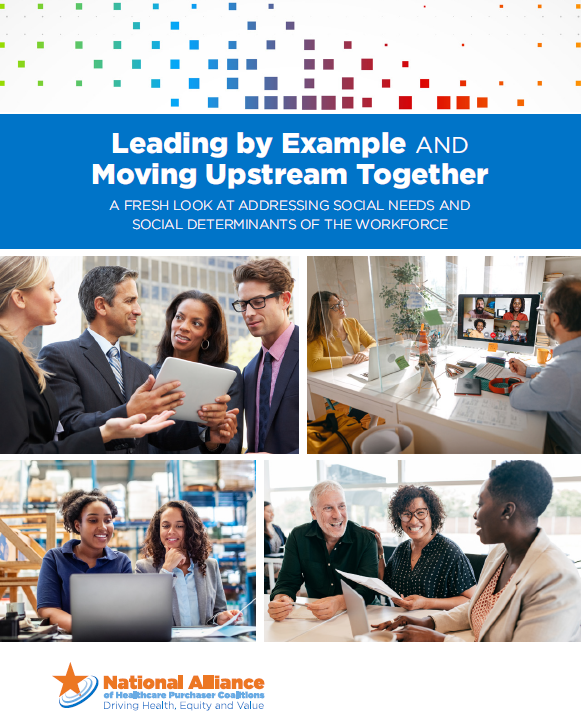Collaboration with the CDC and NNPHI identified strategies and process to enhance employee and community well-being

WASHINGTON – January 13, 2022 – A key issue facing our healthcare system today is the impact of the social needs, social risks, and social determinants on today’s workforce. No longer just a public health concern, issues with economic instability, housing, transportation, and access to healthcare can have a significant impact on the health and well-being of employees and their families. To help employers address these factors, the National Alliance of Healthcare Purchaser Coalitions (National Alliance) conducted a yearlong learning collaborative with the Centers for Disease Control and Prevention’s Office of the Associate Director for Policy and Strategy and the National Network of Public Health Institutes. The findings and recommendations were released today.
The project included the Kentuckiana Health Collaborative and Pittsburgh Business Group on Health and six of their employer members. The coalitions are members of the National Alliance and have been engaged in the exploration of social determinants, health equity, and racial bias. Participating employers used various tools and resources to develop an action plan that would address at least one or more social determinants impacting their workforce.
“Leading coalitions and employers are increasingly examining the social factors that most impact the health and well-being of their workforces,” said Margaret Rehayem, National Alliance vice president. “Bringing together community data with company data can help employers understand and address these factors in a meaningful, realistic way that supports a thriving and productive workplace. The value and importance of public/private partnerships and learning together can’t be overstated.”
Key takeaways from the learning collaborative:
- Employers used community data to identify potential issues and prevalence of social needs and risk by employee ZIP code to better identify population health challenges and/or health inequities (e.g., access to care, quality gaps). Participants then validated issues through available demographic data, engaging site management, internal survey data, and employee resource groups.
- Participants developed their own internal team to develop a work plan that prioritized actions based on the broadest impact and feasibility of improvement. This included specific strategies to support meaningful improvement such as addressing transportation challenges or creating financial stability programs and went beyond traditional health and well-being programs and health plan program/service offerings.
- Many of the participants have a longer-term goal to integrate health equity (not limited to social needs and risks) into existing structures and objectives similar to organizational approaches to quality, safety and well-being by establishing a baseline and a system of accountability to monitor progress against key process and outcomes metrics.
Recommendations for employers include:
- Gather data – Use community data to identify potential issues and prevalence of social needs and risk; understand how correlating social risk factors can adversely affect specific populations; and use a combination of data sources to identify population health challenges and inequities.
- Use data to assess and prioritize – Validate observations and dive deeper by using various sources of data and engage public and/or private organizations to highlight the intersection of data from the community with internal statistics and prioritize actions with the broadest impact.
- Develop and execute a workplan – Consider a variety of health and well-being programs as potential interventions; work with health plans and other vendors to develop a work plan; and partner with community resource organizations that can look at data by location and demographic groups.
- Measure and sustain gains – Integrate health equity into an organizational approach; establish a baseline, monitor progress and measure outcomes; and conduct reviews to assess progress and identify opportunities for improvement.
The collaborative also engaged industry experts that provided insights around the value of public-private partnerships from organizations such as United Way, U.S. Chamber of Commerce, and digital health company Sharecare. Sharecare also provided interpretative insights to four of the six employers on various social risks and social determinants experienced by employee and worksite communities, as well as potential implications for well-being, equity, and pandemic recovery goals.
“Given the far-reaching impact to performance, morale and cost of care, this project found that employers were interested in their employees’ social determinants of health,” said Christa-Marie Singleton, MD, MPH, Chief Medical Officer, Office of the Associate Director for Policy and Strategy, Centers for Disease Control and Prevention. “Organizations may want to consider that many of their employees may be facing issues such as homelessness and food insecurities. When employers can address the pressing conditions in their communities, it not only benefits the broader population, but also ensures that they have a healthier and more productive workforce.”
About National Alliance of Healthcare Purchaser Coalitions
The National Alliance of Healthcare Purchaser Coalitions (National Alliance) is the only nonprofit, purchaser-led organization with a national and regional structure dedicated to driving health and healthcare value across the country. Its members represent private and public sector, nonprofit, and Taft-Hartley organizations, and more than 45 million Americans, spending over $300 billion annually on healthcare. To learn more, visit nationalalliancehealth.org and connect with us on Twitter and LinkedIn.
# # #